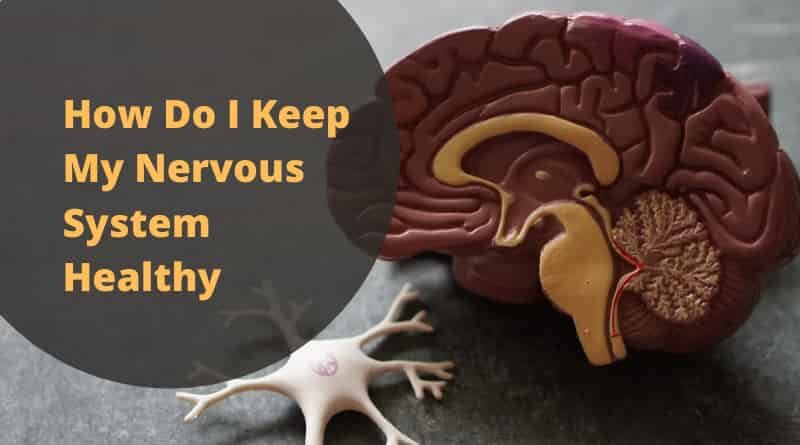How Do I Keep My Nervous System Healthy?
The nervous system is responsible for virtually everything your body does. It controls breathing, your heartbeat, the sensation of cold air on your skin. In short, the nervous system controls all of your internal functions and serves as your body’s window to the outside world. What would life be like without the nervous system? You wouldn’t have one.
So, what can you do to ensure your nervous system’s health? You can easily boost the functioning of your nervous system by exercising regularly, eating a healthy diet, and taking supplements such as Nerve Control 911.
This article discusses how the nervous system works. Though it is by no means a thorough examination of the nervous system, it shows how instrumental the nervous system is to life itself. Without the nervous system, we would be nothing. So, why not learn a little more about it?
Table of Contents
What Is the Nervous System?
Your nervous system is the catalyst of every function in your body. It initiates every movement, every breath, and every heartbeat. It connects the brain to the rest of the body via the spinal cord and without its proper functioning, you would perish.
Your nervous system affects every aspect of your health including the following:
- Thoughts, memory, learning, and feelings.
- Sensory information.
- Movements, such as balance and coordination.
- Sleep, healing, and aging.
- Heartbeat and breathing patterns.
- Physiological responses to stressful environments.
- Digestion, as well as hunger and thirst.
- Hormonal processes such as those that occur in puberty.
The nervous system is the command center for the body, regulating all of your systems and processing external stimuli. Your vast network of nerves sends electrical signals to and from your brain, cells, glands, and muscles. These nerves also receive information from the external environment that regulate your response.
What Does the Nervous System Do?
Specialized cells called neurons are the processing department of your nervous system. Neurons send and receive electrical signals all over your body. Without neurons, you would have a bunch of coded electrical signals that your body wouldn’t be able to understand.
Different kinds of neurons are responsible for different kinds of signals. Motor neurons tell your muscles to move. Sensory neurons transport information to your senses and send signals to your brain. Other types of neurons control your body’s automatic functions such as breathing.
What Are the Different Parts of the Nervous System?
The nervous system has two primary subsects. Each portion contains specific types of neurons that carry electrical signals from the brain to other parts of the body and back. The two main systems of the neurological network are the central nervous system (CNS) and the peripheral nervous system.
Central Nervous System (CNS)
Your brain and spinal cord comprise the central nervous system(1). Your brain sends messages to the rest of the body down the spinal cord and into the other parts of your body. Each of your nerves has a protective outer layer called myelin that insulates the nerves and conducts the electrical signals.
Peripheral Nervous System
Your peripheral nervous system consists of the many nerves that branch out from the spinal cord. This system relays messages from your brain and spinal cord to your organs, extremities, and skin.
The peripheral nervous system consists of the following subsects:
- Somatic nervous system: responsible for guiding movements.
- Autonomic nervous system: responsible for non-voluntary movements such as breathing.
Read: Healthy Ways to Strengthen Your Immune System
What Conditions and Disorders Affect the Nervous System
The nervous system is delicate and there are many different conditions that can cause it damage. Disease, strokes, traumatic injuries, compression, toxic substances, and the aging process cause significant damage that disrupts your body’s functions.
- Disease- many infections, cancers, and autoimmune disorders such as lupus can damage the nervous system. Diabetes, for example, can cause diabetic neuropathy. Another neurological condition known as multiple sclerosis can attack the nerves’ myelin.
- Stroke- strokes occur when something obstructs a blood vessel in the brain or a blood vessel bursts. Without enough blood, tissue death occurs in the brain and people can sustain permanent damage within minutes of having a stroke. Strokes can also cause nerve damage due to the disruption in the brain’s function.
- Traumatic injuries- traumatic injuries can damage or destroy nerves in accidents by crushing, stretching, or cutting in an accident. Car crashes and falls are common injuries that can damage nerves anywhere in your body.
- Compression- if a nerve gets compressed or pinched, it won’t get enough blood to do its job.
- Toxic substances- chemotherapy medicines, alcohol, and other toxic substances can cause peripheral neuropathy or nerve damage. People with kidney disease are also more likely to develop nerve damage because their kidneys have a difficult time flushing toxic substances.
- Aging process- as we age, the nervous system deteriorates and sustains damage.
Read: Tips For Protecting Your Hearing
How Do I Keep My Nervous System Healthy?
Since your nervous system is the command center for your body, you must take care of it if you want to feel healthy and function properly. Schedule regular doctor’s visits. Adhere to a nutritious diet, avoid drugs, and moderate your alcohol consumption. Additionally, supplements such as Nerve Control 911 can prevent nerve damage.
When Should I Call My Doctor?
You should call your doctor right away if you have any sudden changes in your health such as losing coordination or severe muscle weakness. You should also see your doctor if you notice the following:
- Problems with vision or headaches.
- Slurred speech.
- Numbness, tingling, or loss of sensation in your arms or legs.
- Tremors or tics (random muscle movements).
- Changes in behavior or memory.
- Problems with coordination or moving your muscles.
Key Takeaways
The nervous system controls every aspect of your body. Protect it at all costs or face your own demise. Promoting your nervous system’s health isn’t as hard as it seems. You can make simple changes to improve your nervous system’s health such as eating healthy foods, monitoring your alcohol consumption, and taking a nervous system supplement. These changes are the best options you have for maintaining your nervous system health.




